Format Legend Dialog Box Properties
This topic describes how you can use the Format Legend dialog box to format the legend of a chart. Server displays the dialog box when you right-click a chart and select Format Legend (unavailable to org chart and gauge bubble chart) from the shortcut menu.
This topic contains the following sections:
- General Tab Properties
- Placement Tab Properties
- Border Tab Properties
- Font Tab Properties
- Label Tab Properties
You see these elements on all the tabs:
OK
Select OK to apply any changes you made here.
Cancel
Select Cancel to close the dialog box without saving any changes.

Select to view information about the Format Legend dialog box.

Select to close the dialog box without saving any changes.
General Tab Properties
This tab shows some general information of the chart legend.
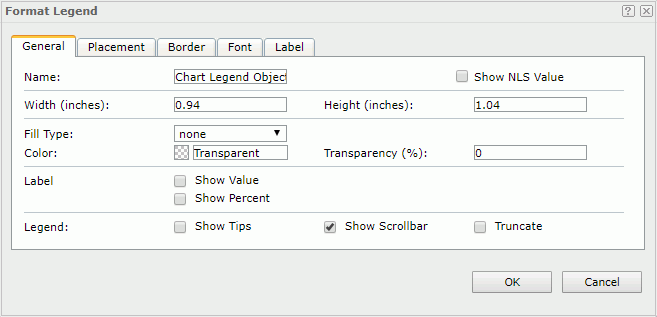
Name
Specifies the display name of the chart legend.
Show NLS Value
Select to show the translated name for the display name of the object in the Name text box if you have enabled the NLS feature and translated it, and when you have not modified the display name of the object.
Width
Specifies the width of the chart legend.
Height
Specifies the height of the chart legend.
Fill Type
Specifies the type for filling the chart legend. It can be one of the following: None, Color, Texture, Gradient and Image. If Gradient or Image is selected, you can specify the gradient or image by the property Fill Type in the Background category of the chart legend in the Inspector.
Color
Indicates the background color of the chart legend. It takes effect only when Fill Type in this tab is Color.
To change the color, select the color indicator to select a color from the color palette. You can select More Colors in the color palette to access the Color Picker dialog box in which you can select a color within a wider range. You can also type a color string in the format #RRGGBB directly in the text box. If you want to make the background transparent, type Transparent in the text box.
Transparency
Specifies the transparency of the legend background color.
Show Value
Specifies whether to show the value of each legend.
Show Percent
Specifies whether to show the percentage of each legend.
Show Tips
Specifies whether to show the corresponding data information when the mouse pointer points at a target in the chart legend.
Show Scrollbar
Specifies whether to show a scrollbar on the legend to fully view the legend content when the content does not fit into the legend.
Truncate
Specifies whether to truncate the legend entry label text when the text overflow the labels.
Placement Tab Properties
This tab shows the position-related information of the chart legend.
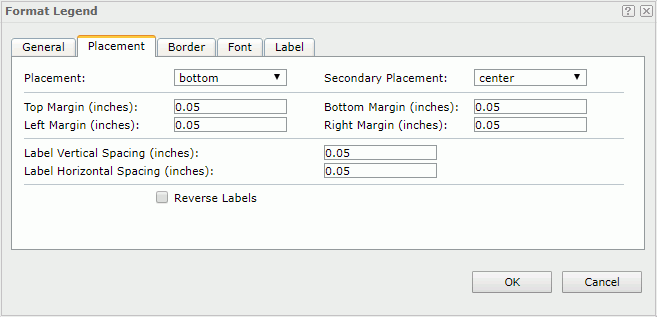
Placement
Specifies the position of the legend in the platform.
Secondary Placement
Specifies the position of the legend on the basis of the Placement property.
Top Margin
Specifies the distance between the legend labels and the top border of the legend.
Bottom Margin
Specifies the distance between the legend labels and the bottom border of the legend.
Left Margin
Specifies the distance between the legend labels and the left border of the legend.
Right Margin
Specifies the distance between the legend labels and the right border of the legend.
Label Vertical Spacing
Specifies the vertical distance between two adjacent legend labels.
Label Horizontal Spacing
Specifies the horizontal distance between two adjacent legend labels.
Reverse Labels
Specifies whether to arrange the legend labels in a reverse order.
Border Tab Properties
This tab shows information about borders of the chart legend.
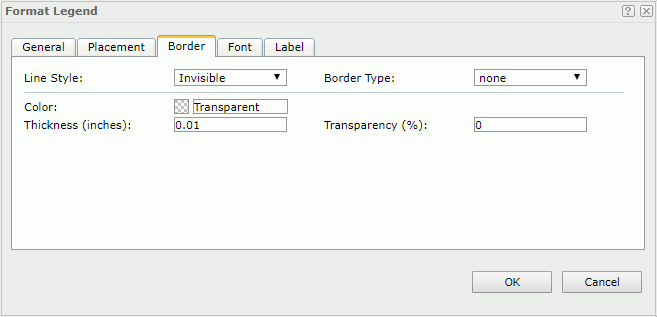
Line Style
Specifies the line style of the legend borders.
Border Type
Specifies the type of the legend borders.
Color
Specifies the color of the legend borders.
Transparency
Specifies the color transparency of the legend borders.
Thickness
Specifies the thickness of the legend borders.
Font Tab Properties
Specify the font properties of the chart legend.
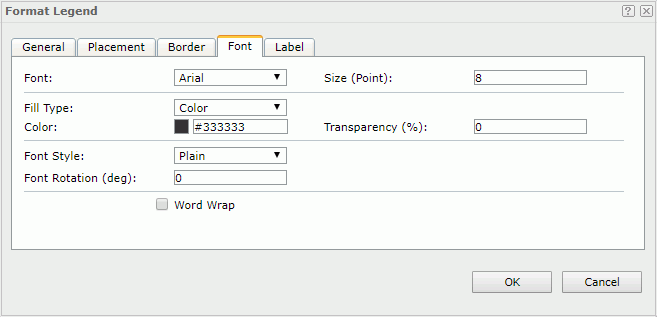
Font
Specifies the font face for the legend labels.
Size
Specifies the font size for the legend labels.
Fill Type
Specifies the fill type for the legend labels. It can be one of the following: None, Color, Texture, and Gradient. If Gradient is selected, you can specify the gradient or image by the property Fill Type in the Label category of the chart legend in the Inspector.
Color
Specifies the color for the legend labels. It takes effect only when Fill Type in this tab is Color.
Transparency
Specifies the transparency for the legend labels, in percent.
Font Style
Specifies the font style of the text. It can be one of the following: Plain, Bold, Italic and Bold Italic.
Font Rotation
Specifies the rotation angle of each legend label around its center, in degrees.
Word Wrap
Specifies whether to enable word wrapping for the label text.
Label Tab Properties
Specifies the text of the legend entry labels. This tab is available only when the legend entry labels show the values of the field displayed on the category or series axis of the chart.
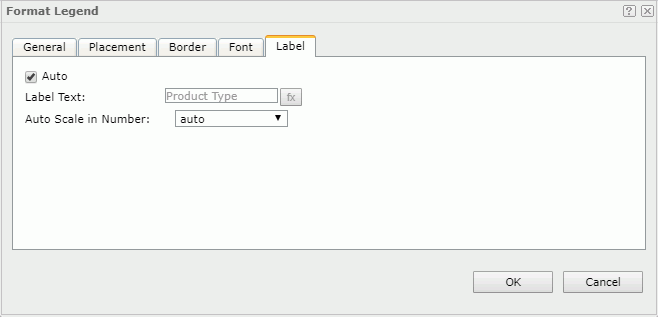
Auto
If selected, the legend entry labels display values of the category/series field. You can clear it to customize the label text.
- Label Text
Specifies the text of the legend entry labels. Type the desired label text manually or select to select a field from the drop-down list to use its values as the label text.
to select a field from the drop-down list to use its values as the label text.
Auto Scale in Number
Select true if you want to automatically scale the values that are of the Number data type when the values fall into the two ranges:- When 1000 <= value < 10^15, Logi Report uses the following quantity unit symbols of the International System of Units to scale the values: K (10^3), M (10^6), G (10^9), and T (10^12).
- When 0 < value < 0.001 or value >= 10^15, Logi Report uses scientific notation to scale the values.
The default value auto means that the setting follows that of the chart.
 Previous Topic
Previous Topic
 Back to top
Back to top